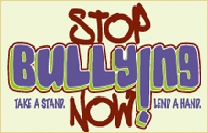|
In this article...
|
"Gay youth in communities of color represent a minority within a minority, putting them at greater risk of being bullied," said Heather Cobb, senior director of media relations at Mental Health America,  which sponsored a study of Latino parent's views on bullying, sexual orientation and prejudice.
which sponsored a study of Latino parent's views on bullying, sexual orientation and prejudice.
"We found that more needs to be done to provide Latino parents the right tools to have these difficult conversations with their children," she said.
 The study reveals that 95 percent of parents believe that information regarding sexual orientation should come from them, but most haven't started to talk with their children. The survey by the national non-profit organization is part of their overall initiative "What Does Gay Mean?" a public educational project especially intended to reduce bullying based on sexual orientation.
The study reveals that 95 percent of parents believe that information regarding sexual orientation should come from them, but most haven't started to talk with their children. The survey by the national non-profit organization is part of their overall initiative "What Does Gay Mean?" a public educational project especially intended to reduce bullying based on sexual orientation.
Cobb said their goal is to reduce prejudice against LGBT in communities of colors. In an effort to prevent discrimination and the harmful effects of bullying, they hope to foster a better understanding of how parents and children can discuss issues of tolerance and respect for all people.
The study also shows that 63 percent of parents think it is relevant to teach their children that it isn't right to discriminate against gays but 70 percent believe they are not prepared to talk with them about gay people.
"I had always heard the word ‘gay' being used with negative connotations," said Tania Unzueta, producer of "Homofrecuencia", a radio show in Spanish aimed at lesbian, gay, bisexual and transgender (LGBT) listeners and aired by the Chicago non-profit community radio station Radio Arte.
"When I was in high school there were rumors about who was and wasn't gay and there was a trend to isolate gay people and exclude them from parties and social activities," said Unzueta, 24.
Besides overcoming her own prejudices, for Unzueta the hardest part was the relationship with her family. "At the beginning, my mother told me she didn't want to talk about it and that there was no need to tell everybody."
The overall reaction she initially encountered was silence, she said. And, experts agree, silence leave kids vulnerable to bullying since they feel extremely insecure, don't have any trusted person to turn to for advice, and have the guilt and shame of being something that even their parents disapprove.
"Reducing bullying based on sexual orientation isn't about sexual orientation, it is about tolerance, it is about talking to kids about how to negotiate relationships across differences and how to negotiate relationships with someone who might have a different belief system than them," said Dr. Stacey S. Horn, associate professor of educational psychology and human development in the College of Education at the University of Illinois at Chicago.
Horn, who has been dedicated to researching and teaching on LGBT youth issues to create safer schools, said that a lot of the bullying is around gender role rather than sexual orientation where students are teased because they are perceived to be gender non-conforming or they don't perform gender roles in the way people think they should.
When she trains teachers and talks to her own students she emphasizes the fact that someone can identify as gay and not be sexually active, and for that reason it is wrong to equate sexual identity with sexual behavior.
According to Horn, teacher training and transmitting consistent messages of tolerance and respect to students are key issues in preventing bullying but it is also important to bring communities together where all interested parties work in unison to create safe environments for young people.
"The more we can get parents and school personnel talking, the better," she said. "It's an issue that needs a community response, it can't just be the school or the parents; it has to be people working together."
As time went by, Unzueta's interaction with her mother improved and they became closer, being able to discuss her own sexual identity and strengthening their mother-daughter relationship.
"My mother apologized to me and told me she can't believe she asked me not to talk about something that was uncomfortable to her and also told me that it is important to talk and learn about these issues," she said. "I appreciate the effort that she and my father have made to change their attitude."
---
Isaac Itman is a writer for the OMHRC. Comments? Email: info@omhrc.gov
Links
Stop Bullying Now!http://stopbullyingnow.hrsa.gov/index.asp?area=main
Dealing with bullying
http://kidshealth.org/teen/your_mind/problems/bullies.html 
Bullying Institute
http://bullyinginstitute.org/ 
Radio Arte
http://www.wrte.org/ 
Mental Health America
http://www.nmha.org/ 
Youth Violence Prevention
http://www.safeyouth.org/scripts/faq/stopbullying.asp 
Publications
Take action against bullying [PDF, 354KB]Listen, Learn, Respect [PDF, 354KB]
Bullying is not a fact of life [PDF, 1.05MB]
What Does Gay Mean?

Warning signs that a child is being bullied [PDF, 348KB]
State laws related to bullying among children and youth [PDF, 386KB]
Statistics
What kids say about bullying?
Youth Violence: Fact Sheet
You will need Adobe Acrobat® Reader™ to view PDF files located on this site. If you do not already have Adobe Acrobat® Reader™, you can download here for free.



 go to top
go to top